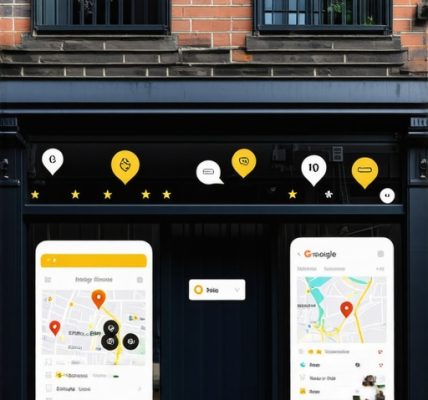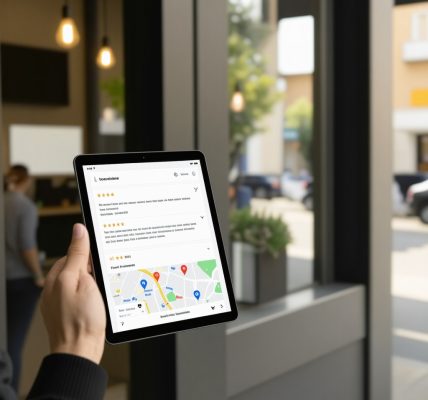Understanding the Importance of Positive Google My Business Reviews
In today’s digital landscape, Google My Business (GMB) has become a pivotal tool for local businesses striving to enhance their online visibility. One of the most significant factors that influence a business’s local search ranking is the number and quality of its reviews. Positive GMB reviews not only boost your credibility but also attract new customers, making it essential to implement effective strategies for generating them.
Why Focus on Generating Positive Reviews?
Positive reviews act as social proof, reassuring potential customers of your business’s reliability and quality of service. In fact, studies show that a majority of consumers read online reviews before making a purchase decision. This underscores the need for businesses to actively solicit positive feedback from satisfied customers. By fostering a culture that encourages review generation, your business can stand out in a competitive market.
Effective Strategies for Generating Positive GMB Reviews
1. Provide Exceptional Customer Service
The first step in generating positive reviews is to ensure that every customer has a fantastic experience with your business. Exceptional customer service leads to satisfied clients who are more likely to leave glowing reviews. Train your staff to be friendly, responsive, and attentive to customer needs, which can significantly enhance their overall experience.
2. Ask for Feedback
Once you’ve provided excellent service, don’t hesitate to ask your customers for feedback. A simple request can go a long way. You might say, “If you enjoyed your experience, we would greatly appreciate it if you could take a moment to leave us a review on Google!” This direct approach can significantly increase the likelihood of receiving positive reviews.
3. Make it Easy to Leave Reviews
Facilitating the review process is crucial. Provide your customers with direct links to your GMB profile, or create a QR code that they can scan to access the review page immediately. The easier you make it for customers to leave reviews, the more likely they are to do so.
4. Follow Up with Customers
Post-purchase follow-ups can be an effective way to encourage reviews. Send a personalized thank-you email after a purchase, and include a link to your GMB profile for them to share their experiences. This not only shows that you value their business but also gently reminds them to leave a review.
5. Respond to All Reviews
Engaging with customers through responses to their reviews is essential. Thank those who leave positive feedback and address any concerns raised in negative reviews. This demonstrates that you care about customer opinions and can encourage others to share their experiences as well.
6. Leverage Social Media
Utilizing your business’s social media platforms can effectively drive traffic to your GMB page. Share snippets of positive reviews, and encourage your followers to leave their own feedback. Highlighting customer testimonials on social media not only promotes your business but also reinforces the importance of leaving reviews.
Conclusion
Generating positive GMB reviews is a strategic process that involves excellent service, direct engagement, and effective follow-up. By implementing these strategies, you can significantly improve your online reputation and attract more customers. To learn more about optimizing your Google Business listing, check out our article on how to optimize your Google Business listing effectively.
Maximizing the Impact of Google My Business Reviews
As we delve deeper into the world of Google My Business reviews, it’s vital to understand that generating positive feedback is just the beginning. Once you have a collection of reviews, the next step is maximizing their impact. Leveraging these reviews effectively can significantly enhance your local SEO efforts and increase customer engagement.
Utilizing Reviews for Enhanced Local SEO
Integrating positive reviews into your overall local SEO strategy is crucial. Search engines like Google consider reviews as a ranking factor. The more positive reviews your business accumulates, the higher your chances of appearing in the local search results. This is particularly important for businesses aiming to secure a spot in the coveted local 3-pack.
1. Highlight Reviews on Your Website
Showcasing customer testimonials on your business website can help build trust with prospective clients. Create a dedicated section for reviews or integrate them within your homepage. This not only adds social proof but also reinforces your credibility in the eyes of search engines. Additionally, consider using schema markup to help search engines understand the context of your reviews better.
2. Incorporate Reviews into Your Marketing Materials
Leverage positive reviews in your marketing campaigns. Whether it’s in email newsletters, social media posts, or print materials, sharing customer feedback can enhance your brand image. Highlighting reviews in your advertising will not only attract new customers but also encourage existing ones to leave their own feedback.
3. Create Review-Based Content
Transforming customer reviews into content can be an effective strategy. Consider writing blog posts that highlight customer experiences, or create case studies based on their feedback. This not only boosts your content marketing efforts but also positions your business as customer-centric and attentive to client needs.
Building a Community Around Reviews
Creating a community around your reviews can further enhance customer loyalty and engagement. Encourage customers to share their experiences and interact with your business online. This can lead to a cycle of positive feedback and increased visibility.
1. Engage with Reviewers
Responding to reviews is a critical part of the review management process. Acknowledge positive reviews with gratitude, and address concerns raised in negative feedback. This not only shows that you value customer opinions but also encourages others to share their experiences. Engaging with your audience fosters a sense of community and can lead to more reviews in the future.
2. Encourage User-Generated Content
Encouraging customers to share their experiences through photos or videos can enhance your online presence. User-generated content not only adds authenticity to your brand but also serves as powerful testimonials. Utilize platforms like Instagram or Facebook to promote customer content, further amplifying your reach.
Monitoring and Adjusting Your Review Strategy
To ensure the ongoing success of your review generation efforts, it’s essential to monitor and adjust your strategy regularly. Keep track of your review metrics and analyze the effectiveness of different tactics. Tools like Google Analytics can provide insights into how reviews impact traffic and conversions.
1. Analyze Review Trends
Look for patterns in your reviews to identify what customers appreciate most about your business. This can guide your customer service approach and highlight areas for improvement. Understanding customer sentiment can also inform your marketing strategies, allowing you to target your messaging effectively.
2. Adapt Your Approach
If certain strategies are yielding better results than others, don’t hesitate to pivot your approach. Experiment with different methods of soliciting reviews, whether through follow-up emails, social media prompts, or in-store requests. Adapting your strategy based on performance data will ultimately lead to better outcomes.
Leveraging Reviews for Local Search Visibility
Understanding how to leverage reviews effectively can drastically boost your local search visibility. When potential customers search for services or products in their area, businesses with a higher volume of positive reviews are more likely to be featured prominently. This phenomenon is especially true for the local 3-pack, where searchers see the top three businesses that Google recommends based on relevance and proximity.
1. Optimize Your Google My Business Profile
To maximize the benefits of your reviews, ensure your Google My Business (GMB) profile is fully optimized. This includes providing accurate business information, selecting the correct categories, and adding relevant keywords to your business description. When your GMB profile is complete, it helps Google better understand your business, which can lead to improved rankings. Additionally, regularly updating your profile with new information and engaging content can keep your audience informed and drive more interactions.
2. Utilize Keywords in Responses
When responding to reviews, incorporate relevant keywords naturally within your replies. This not only shows that you are engaged with your customers but also helps search engines associate those keywords with your business. For instance, if you run a pizza restaurant, mentioning specific menu items or services in your responses can help improve your visibility for those terms. This practice encourages potential customers to click through to your GMB listing.
Building a Reputation Through Effective Review Management
Your online reputation can significantly impact your local SEO rankings. A solid reputation stems from not just the quantity of reviews but their quality as well. Businesses that prioritize active review management tend to see better customer engagement.
1. Monitor Your Reviews Regularly
To maintain a positive online reputation, it is essential to monitor your reviews regularly. Use tools like Google Alerts or reputation management software to stay informed about new reviews. This proactive approach allows you to respond quickly, ensuring that both positive and negative feedback is addressed promptly. Engaging with your customers showcases your commitment to service, further enhancing your reputation.
2. Create a Review Generation Strategy
Having a structured strategy for generating reviews can lead to substantial growth. Consider implementing a follow-up process post-purchase where you kindly ask customers to leave feedback. You can do this via email, SMS, or even in-person requests. By making the review process easy for your customers, you increase the likelihood of receiving more positive reviews, which can elevate your local rankings.
Understanding the Role of Reviews in Consumer Decision-Making
Consumers often rely heavily on reviews when making decisions about where to shop or dine. In fact, studies show that a large percentage of consumers read reviews before visiting a business. This means that creating a positive review environment is crucial for attracting new customers.
1. Showcase Positive Reviews Across Channels
Utilize your positive reviews not only on your GMB profile but also on your website and social media platforms. Featuring testimonials and customer feedback prominently can boost your credibility and encourage more potential customers to choose your business over competitors. You can create a dedicated testimonials page on your website or highlight reviews in your social media posts.
2. Address Negative Feedback Constructively
Handling negative reviews with grace can turn a potentially damaging situation into a positive one. Always respond professionally and offer to rectify the issue. This approach not only reflects well on your business but can also sway future customers who may read the reviews. Demonstrating that you value customer feedback and are willing to improve can significantly enhance your reputation.
Conclusion: The Long-Term Benefits of Review Management
In summary, effective review management is vital for enhancing local SEO and building a strong online reputation. By leveraging positive reviews, optimizing your GMB profile, and engaging with customers, you can improve your visibility in local search results. Ultimately, a robust review strategy leads to greater customer loyalty, increased trust, and, most importantly, higher conversion rates for your business.
Integrating Social Proof for Enhanced Local SEO
Social proof, such as reviews and testimonials, plays a crucial role in influencing consumer behavior. By effectively showcasing social proof, businesses can significantly enhance their local SEO efforts. When potential customers see positive feedback from others, they are more likely to trust your business and consider it as a viable option.
1. Leverage User-Generated Content
Encouraging customers to share their experiences through photos or posts on social media can create authentic user-generated content. This not only enriches your brand’s image but also provides additional visibility online. Share these customer posts on your own social media platforms and website to build trust and encourage more engagement. Highlighting real customer experiences can make your business more relatable and trustworthy.
2. Engage with Local Influencers
Partnering with local influencers can amplify your reach and introduce your business to new audiences. Influencers can create content that resonates well with their followers, showcasing your products or services in a relatable manner. This strategy can lead to increased awareness and potentially drive more traffic to your Google My Business profile.
Utilizing Local SEO Techniques for Business Growth
Implementing local SEO strategies is essential for small businesses aiming to improve their visibility in search results. By focusing on local optimization, businesses can attract more customers from their specific geographic area.
1. Optimize for Local Keywords
Researching and incorporating local keywords into your content and Google My Business profile is vital. Utilize tools like Google Keyword Planner to find keywords that are relevant to your business and location. For instance, if you own a bakery in Denver, target keywords such as “Denver bakery” or “best pastries in Denver.” This helps search engines understand your location and services, improving your chances of appearing in local search results.
2. Create Location-Specific Content
Developing content that addresses local interests, events, or news can significantly enhance your relevance for local searches. Blog posts or articles that discuss community events or highlight local partnerships can attract local customers. This not only boosts your SEO but also positions your business as a community-oriented brand.
Monitoring and Analyzing Your GMB Performance
Regularly monitoring your Google My Business performance is crucial for ongoing optimization. By analyzing your GMB insights, you can gain valuable information about how customers interact with your profile.
1. Track Customer Engagement Metrics
Metrics such as the number of clicks, calls, and requests for directions provide insights into customer engagement with your listing. By understanding which aspects of your profile attract the most attention, you can refine your strategies accordingly. If you notice that more customers are clicking to call your business, consider optimizing your call-to-action and ensuring your contact information is easily accessible.
2. Adjust Your Strategy Based on Feedback
Utilize feedback from customer reviews to make data-driven adjustments to your offerings and services. If customers frequently mention a specific product or service in positive reviews, consider promoting it more prominently on your GMB profile. Conversely, if you receive negative feedback about a particular aspect, addressing these concerns can improve customer satisfaction and enhance your reputation.
Frequently Asked Questions (FAQ) about Local SEO
1. What is local SEO and why is it important?
Local SEO refers to the practice of optimizing your online presence to attract more business from relevant local searches. It’s crucial because it helps small businesses rank higher in local search results, making them more visible to potential customers in their geographic area.
2. How can I improve my Google My Business listing?
To enhance your Google My Business listing, ensure that all information is complete and up-to-date. This includes your business name, address, phone number, hours of operation, and website. Regularly post updates, respond to reviews, and include high-quality images to engage potential customers.
3. What are some effective local SEO strategies?
Effective local SEO strategies include optimizing for local keywords, creating location-specific content, acquiring backlinks from local businesses, and utilizing social proof through customer reviews and testimonials.
4. How do customer reviews affect local SEO?
Customer reviews are a significant factor in local SEO. Positive reviews can enhance your business’s credibility and visibility in search results. Moreover, responding to reviews shows that you value customer feedback, which can improve your reputation and lead to higher rankings.
5. How often should I update my local SEO strategy?
Your local SEO strategy should be reviewed and updated regularly, ideally every few months. Monitor your performance metrics, keep an eye on industry trends, and adjust your tactics based on customer feedback and changes in search engine algorithms.
6. Can social media impact my local SEO?
Yes, social media can influence your local SEO by driving traffic to your website and increasing brand awareness. Engaging with your audience on platforms like Facebook and Instagram can lead to shares and mentions, which can indirectly boost your local search rankings.
7. What tools can I use for local SEO analysis?
There are several tools available for local SEO analysis, including Google Analytics, Google Search Console, Moz Local, and SEMrush. These tools can help you track your performance, monitor keyword rankings, and identify areas for improvement.
8. How important is mobile optimization for local SEO?
Mobile optimization is critical for local SEO, as many users search for local businesses using their smartphones. Ensure your website is mobile-friendly, loads quickly, and provides an excellent user experience to capture mobile traffic effectively.
9. What is the role of backlinks in local SEO?
Backlinks from reputable local websites can significantly enhance your local SEO efforts. They signal to search engines that your business is credible and relevant in the local market, which can improve your ranking.
10. How can I track the success of my local SEO efforts?
You can track the success of your local SEO efforts by monitoring key performance indicators (KPIs) such as website traffic, conversion rates, search rankings, and the number of clicks or calls from your Google My Business listing. Regularly analyzing these metrics will help you understand the effectiveness of your strategies.
Authority Resources for Local SEO
To further enhance your knowledge and understanding of local SEO, consider exploring these trusted resources:
- Moz Local SEO Guide – A comprehensive resource for mastering local SEO, including best practices and strategies.
- Search Engine Land’s Local SEO Guide – An authoritative source for updates and insights on local SEO trends.
- Search Engine Journal Local SEO Articles – In-depth articles and case studies on effective local SEO practices.
- BrightLocal Local SEO Resources – Offers tools and resources specifically designed for local SEO practitioners.
- Google My Business Resources – Official guidelines and tips from Google to optimize your GMB listing.
Conclusion: Elevate Your Local SEO Strategy
In conclusion, mastering local SEO is essential for small businesses looking to thrive in their communities. By integrating social proof, utilizing effective local SEO techniques, and regularly monitoring your Google My Business performance, you can significantly enhance your visibility and attract more customers. Remember, local SEO is not a one-time effort but an ongoing process that requires attention and adaptation. By following the strategies outlined in this guide and utilizing the resources provided, you can position your business for success in the competitive local market.





This post really highlights how crucial positive Google My Business reviews are for local businesses. From my experience managing a small café, I’ve found that exceptional customer service is indeed the foundation for garnering meaningful reviews. Something that’s worked particularly well for us is incorporating a subtle, friendly reminder at the end of each visit—sometimes even leaving a QR code on the receipt, just as suggested here. It makes the process seamless for customers to leave feedback.
One challenge I’ve noticed is balancing the frequency of follow-ups without overwhelming customers. Too many requests can sometimes feel pushy and may have the opposite effect, deterring reviews rather than encouraging them. Has anyone found an effective way to time these follow-ups or craft messages that feel genuine but not intrusive?
Also, the point about responding to all reviews resonated with me. We try to make our replies personalized and address concerns openly, which has helped turn a few negative experiences around.
I wonder, for businesses in highly competitive markets, how much weight does the volume versus the quality of reviews really carry? Are longer, detailed reviews more beneficial than numerous shorter ones? I’d be interested to hear others’ thoughts or experiences on this nuance and any tips on encouraging more in-depth feedback.